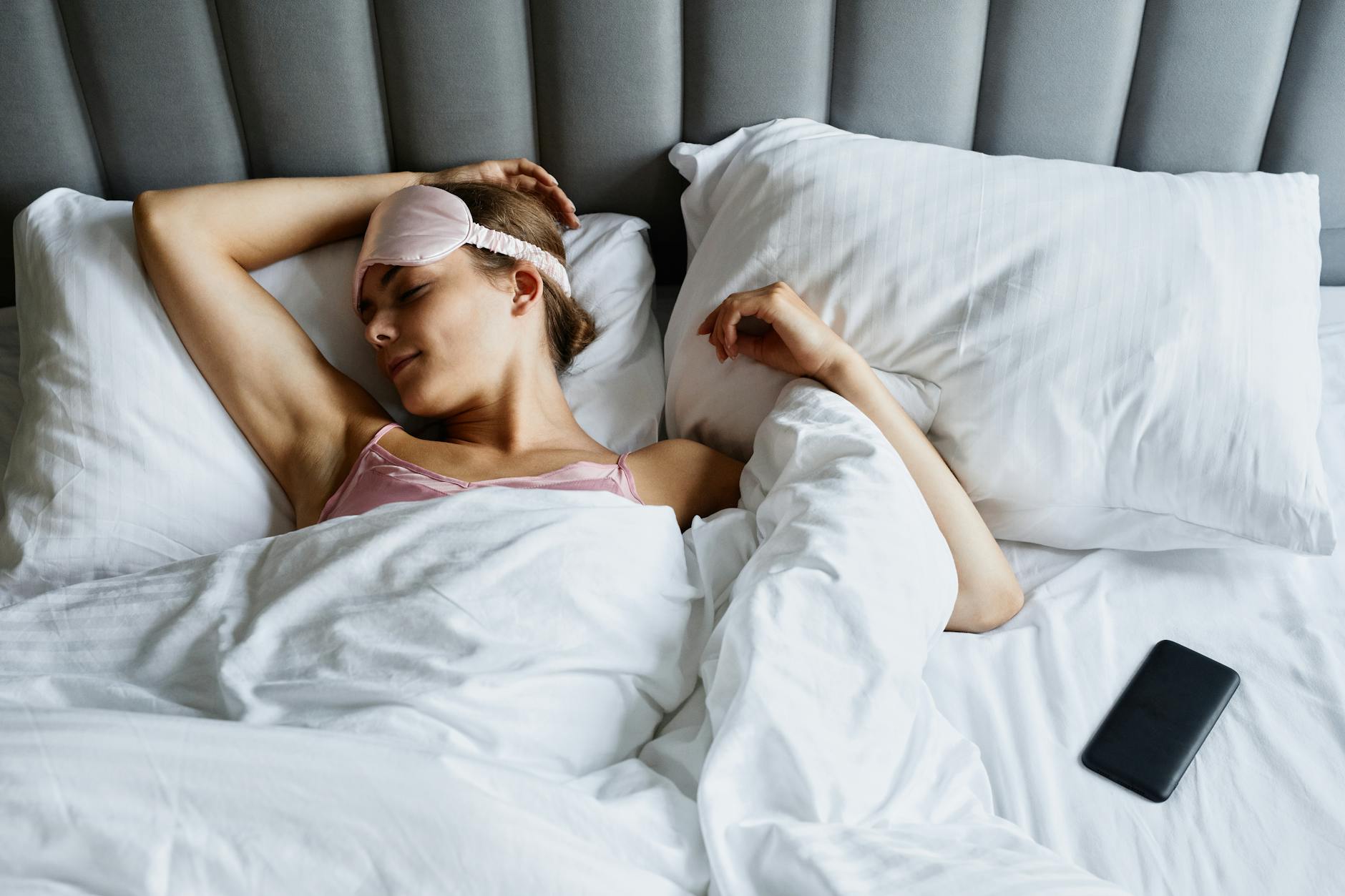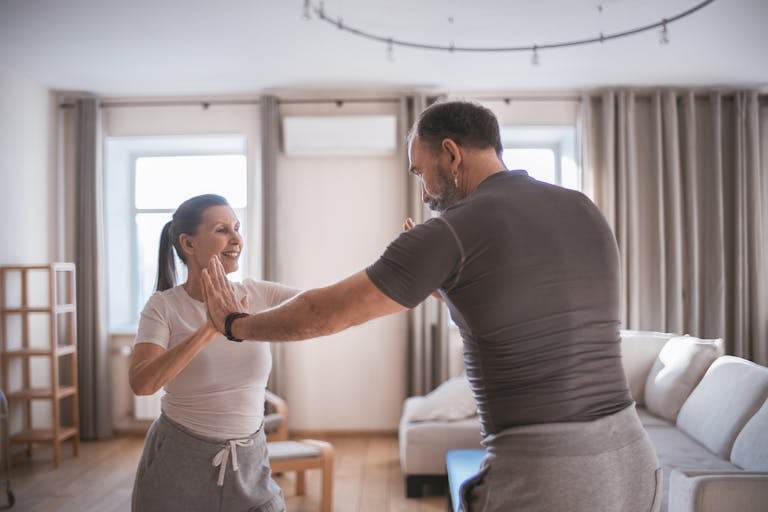The Role of Sleep in Weight Loss Updated Guide for Home Workout Success
The Role of Sleep in Weight Loss: Updated Guide for Home Workout Success. Most people focus on home workout routines, clean eating for beginners, or the best supplements for fat loss when trying to lose weight. However, sleep plays a significant role in weight loss that is often
overlooked. Quality rest helps manage cravings, improves workout recovery, and keeps the body burning fat through the night.
If you want to see real results from a fat-burning morning routine or are serious about getting fit without the gym, it’s time to look at your sleep habits. A proper sleep schedule, combined with a balanced diet and fitness plan, lays the foundation for steady, lasting change.
Learn why making time for sleep is just as important as those other steps and how it fits with proven strategies to burn fat naturally at home for a healthier, stronger you.
Key Takeaways
Understanding the role of sleep in weight loss can transform your approach to fitness plans, from home workout routines to nutrition strategies. Below, I’ve compiled the key lessons that anyone seeking long-term health and fat loss should keep in mind.
 Photo by Niels from Slaapwijsheid.nl
Photo by Niels from Slaapwijsheid.nl
Sleep Is a Foundational Piece of Weight Loss
If you’re focused on the best supplements for fat loss, trying new fat-burning morning routines, or following clean eating for beginners, realize that sleep is just as important—maybe even more. Lack of sleep affects hormones that drive hunger and cravings, making it harder to stick to any plan.
When I don’t get enough quality rest, I notice stronger cravings for carbs and sugar, which can easily derail healthy habits.
Quality Sleep Makes Your Workouts Count
Sleep doesn’t just help you recover from muscle soreness. It powers your energy, supports motivation, and helps your body burn fat more effectively during and after exercise.
Poor rest leaves you sluggish, slows your progress, and makes it less likely for you to stick with your home workout routines. Without good sleep, even consistent training and getting fit can become a struggle, even without a gym.
Sleep Strengthens Your Metabolism
Missing out on sleep slows your metabolism, which means your body hangs onto more fat. Studies have shown that sleep loss directly reduces the amount of fat you lose, even when you follow the same exercise and calorie plan as someone who sleeps well. If optimal fat loss is your goal, don’t ignore your pillow time.
Proper Rest Supports Every Fat Loss Tool
Whether you use fat-burning supplements, track your macros, or meal prep at home, your results always come back to sleep. When sleep is cut short, your body may not respond as well to fat-burning tools or plans. If you want to maximize the benefits of clean eating for beginners or try proven strategies to burn fat naturally at home, deep rest should be part of your plan.
Key Points to Remember
I want to make it easy to remember why sleep matters. Keep these in mind:
- Sleep shapes appetite and cravings—less sleep can mean more hunger and more nighttime snacking.
- Performance drops without rest—you’ll be less likely to finish home workouts strong.
- Metabolism slows when sleep is off—your body may store more calories as fat.
- All fat-loss efforts work better with adequate sleep, exercise, good nutrition, and even supplements need rest to do their job.
Staying committed to quality sleep, alongside healthy eating and movement, builds a solid foundation for anyone serious about weight loss. You don’t have to choose between sleep, exercise, or nutrition—when you combine them, results follow. If you’re curious about how to put this into action, check out my deep dive on how to burn fat naturally at home for practical steps and habits.
The Science Behind Sleep and Fat Loss
Quality sleep is like the hidden engine powering every successful weight loss plan. It doesn’t just give our minds a reset; it also shapes the hormones and systems our bodies use to burn fat, recover after challenging home workout routines, and manage hunger.
When sleep falls short, all the clean eating or Best supplements for fat loss in the world won’t have the same impact. Here’s what every fitness-minded person needs to know about how sleep works with metabolism and hunger hormones.
How Poor Sleep Drives Hunger and Cravings
You know those days when nothing but carbs and sugar seems to satisfy? That’s not just a lack of willpower—it’s your hormones talking. The Role of Sleep in weight loss is closely tied to two key hormones: leptin and ghrelin.
- Leptin signals fullness. Think of it as your “I’m satisfied” cue after a good meal.
- Ghrelin is the hunger hormone. It ramps up your drive to eat, especially junky snacks.
When you don’t get enough sleep, leptin levels drop and ghrelin shoots up. That means you’re far more likely to crave salty chips or sugary cereal, especially after a late night, even if you planned to stick to clean eating for beginners.
According to research explained in this WebMD article on sleep and weight loss, people who slept less lost significantly less fat—even when sticking to the same calorie limit—because increased cravings caused more snacking and, often, less control.
Not getting your seven to nine hours can:
- Increase late-night cravings for starchy foods and sugar
- Lower your ability to resist snacks, even with the best intentions
- Make clean eating almost impossible to stick with when willpower is low
This is why prioritizing sleep is just as crucial as planning meals or picking the right fat-burning supplements.
Sleep’s Effect on Metabolism and Energy Expenditure
 Photo by Towfiqu barbhuiya
Photo by Towfiqu barbhuiya
There’s no magic fat-burning morning routine if your metabolism is sluggish from poor sleep. Scientists have found that when we’re sleep deprived, our resting metabolic rate (the calories we burn just by being alive) drops. Every night spent tossing and turning can mean fewer calories burned throughout the next day, even if you nail your home workout routine.
Let’s break it down:
- Sleep deprivation slows metabolism: Fewer calories burned just sitting, standing, and existing
- Hormones that regulate glucose and insulin levels become disrupted, making fat loss more challenging and potentially causing the body to retain fat stores.
- Energy for exercise drops: Less motivation and stamina for getting fit without the gym
A quality night’s sleep also boosts how well our bodies use fat for energy during workouts. If you’re consistent with routines like a fat-burning morning routine, deep sleep will allow your body to tap into fat stores efficiently. The research behind this is solid, as covered in this scientific overview of sleep and metabolism.
If your goal is steady results, not just quick fixes, making sleep a pillar of your plan will help you get more from every workout, each meal, and even the best supplements for fat loss you might use. To take the next step, consider the science-backed approach to getting fit without a gym, which emphasizes the importance of sleep as a core support for lifelong, healthy habits.
Sleep, Recovery, and Home Workout Routines
When it comes to The Role of Sleep in Weight Loss, most people don’t realize that quality rest separates a mediocre plan from impressive results. Pairing home workout routines with good sleep turns every squat, pushup, and plank into real progress you can see and feel.
If your goal is to get leaner, stronger, and avoid frustrating plateaus, focusing on recovery isn’t a luxury—it’s the secret weapon.
Optimizing Recovery for Consistent Progress
 Photo by cottonbro studio
Photo by cottonbro studio
Recovery is where the real magic happens. A solid night of sleep is when your body repairs tissue, restores energy, and grows stronger from training.
If you do your home workout routines but cut the night’s rest short, your muscles never fully recover. You miss out on gains, your risk of injury spikes, and fatigue builds up until motivation tanks.
Here’s why quality sleep is a total game-changer for at-home workouts:
- Muscle Repair: Deep sleep is the time when most muscle repair and rebuilding occur. This is crucial after strength sessions, HIIT, or even a challenging fat-burning morning routine.
- Hormone Reset: Hormones released during sleep (like growth hormone and testosterone) support fat loss and lean muscle growth. Disrupting sleep can slow down progress.
- Reduced Injury Risk: Tired muscles are stiff, slow to react, and less stable. Skipping rest increases the risk of strains or injuries, even with perfect form.
- Better Mood and Drive: A solid sleep schedule helps you wake up ready to crush your next session, stick to clean eating for beginners, and avoid the cycle of burnout.
To stay consistent, prioritize recovery just as you track sets and reps. Research indicates that sleep deprivation alters muscle hormone levels and slows tissue healing, ultimately impacting the outcomes of regular training. For more information, refer to the scientific research on sleep and muscle recovery.
A few ways to make sleep support your fitness journey:
- Stick to a schedule: Aim for 7–9 hours of sleep, going to bed and waking up at the same time every day, whenever possible.
- Wind down without screens: Blue light messes with melatonin production and can delay recovery.
- Pair smart nutrition with rest: What you eat also helps your body repair—combine it with sleep for maximum effect. Discover how recovery, movement, sleep, and nutrition all work together in this helpful breakdown of workout recovery.
Remember, skipping sleep after a killer at-home workout can make even the Best supplements for fat loss less effective. A rested body uses nutrients and recovery strategies far more efficiently.
If you want actionable routines to follow, check out my guide to home workout routines that pair perfectly with healthy sleep habits.
Pairing proper rest with regular exercise and smart nutrition builds the foundation for a lasting transformation. That’s the kind of approach that keeps your fitness journey strong and helps every early alarm for a fat-burning morning routine become worth it.
Morning Routines: Leveraging Sleep for Fat-Burning Success
Waking up refreshed isn’t just about feeling good—it’s a real advantage for burning fat and staying on track with ambitious health goals. The Role of Sleep in Weight Loss becomes crystal clear every morning when energy, motivation, and willpower are at their peak.
If you want to nail a fat-burning morning routine or commit to home workout routines, it all starts with what happens the night before. Restful sleep fuels better choices, steadier movement, and consistent results, especially for those focused on clean eating for beginners or trying to get fit without the gym.
Starting Your Day Energized for Fat Loss
 Photo by Thomas Benedetti
Photo by Thomas Benedetti
After a solid night’s rest, the first hours of the day can set the tone for every fat loss effort. Quality sleep makes it easier to:
- Get out of bed feeling alert, not groggy or desperate for caffeine
- Stick to a morning habit, like stretching, a brisk walk, or a simple home workout routine
- Reach for water instead of sugar-loaded coffee drinks
- Choose a protein-rich breakfast, which supports fat loss and tames cravings for hours (learn how a smart breakfast helps you burn fat here)
Consider how poor sleep affects your morning. You’re more likely to skip exercise, grab the fastest food, and put off your goals for another day. Sleep strengthens willpower, makes decision-making easier, and encourages healthy habits before the day gets away from you.
For anyone experimenting with a new fat-burning morning routine, sleep is the foundation. When I consistently get 7–9 hours of rest, I notice:
- More motivation to move right after waking up
- Fewer excuses to skip hydration or healthy meals
- Higher adherence to a structured plan instead of “winging it”
Restful sleep gives your body the recovery it needs. Muscles feel less stiff, and energy flows more naturally, making those early minutes the best time for an at-home workout. Even a short session pays off for fat loss, especially when you keep at it for weeks, not just days. This is one reason I always recommend simple home workout routines, detailed in my workout routines guide, that pair perfectly with a strong sleep schedule.
Starting your day this way builds powerful momentum. You’re hydrated, fueled, and moving with intention. That momentum snowballs, supporting smart food decisions and sharper focus during the rest of the day. Want to see how a few morning habits can make a difference? Discover these morning habits that can aid in weight loss with real-life tips.
Pairing restful sleep with wise morning choices turns willpower into routine. When the sun comes up, your body is ready—and so are your results. If you’re still chasing consistency, remember that every solid night’s sleep pays off with better mornings and better fat-burning results, day after day.
Nutrition, Sleep, and the Power of Supplements
Balancing what you eat, how you rest, and which supplements you use can unlock real results in fat loss and fitness. Quality sleep isn’t just something nice to have on a weight loss journey—it’s the force that ties together home workout routines, meal choices, and fat-burning supplements.
The Role of Sleep in Weight Loss becomes even more apparent when you see how proper nutrition and smart supplementation work in conjunction with deep, restful nights to improve energy and metabolism.
Pairing clean eating for beginners with simple sleep strategies puts you ahead, making every fat-burning morning routine and home workout count toward your goals.
Best Supplements for Supporting Sleep and Fat Loss
 Photo by Nataliya Vaitkevich
Photo by Nataliya Vaitkevich
When looking for the Best supplements for fat loss, it’s smart to choose options that support both recovery and high-quality sleep. A night of deep rest allows the body to tap into fat stores, repair muscle, and regulate key hormones. For anyone sticking to home workout routines or trying to get fit without the gym, here’s what works well—and safely.
Some of my top picks for fitness-minded men and women:
- Nighttime Fat Burners: Many blends feature ingredients such as green tea extract, L-theanine, and 5-HTP to promote deeper sleep while gently enhancing the body’s natural ability to burn fat overnight. Bright combinations like these can serve as an extra boost, complementing consistent training and clean meals. See one of the most-reviewed nighttime fat burners.
- Magnesium: This mineral relaxes muscles and calms the nervous system, making it easier to fall asleep and stay asleep. Better rest supports stronger mornings and more progress from fat-burning morning routines.
- Melatonin: If sleep schedules are disrupted due to travel or stress, this supplement can gently help the body return to a natural rhythm, supporting hormones that regulate fat storage and hunger. Use in small amounts as needed.
- Protein or collagen before bed: A scoop of quality protein or collagen can help muscle repair while you rest, which boosts metabolism and strengthens results from home workout routines.
Thinking about safety is always essential. Choose well-known products, start with the lowest recommended dose, and track how your body feels. Always pair supplements with whole foods and a solid sleep schedule for best results.
If you’re interested in natural fat-burners, options like caffeine, green tea, and soluble fiber can be a good fit—pay attention to timing so they don’t disrupt your sleep. According to this trusted breakdown of natural fat burners, these options offer benefits when used thoughtfully.
Pairing the right supplements with solid sleep habits allows your body to recover fully, repair muscle from workouts, and manage cravings effectively. This approach works even better when you choose clean eating for beginners and stick to simple routines you can maintain.
The Impact of Meal Timing and Nutrition on Sleep
What you eat and when you eat it affect your ability to unwind and rest deeply. Heavy, late-evening meals can disrupt sleep patterns, leaving you groggy and stalling fat loss progress. Research indicates that eating earlier in the day can lead to better appetite control and may aid in weight regulation, as explained in this article on how meal schedules impact weight.
The best approach I’ve found is simple:
- Eat balanced meals that include protein, healthy fats, and slow-digesting carbs earlier in the day.
- Avoid caffeine and heavy foods at least three hours before bed.
- Finish your last meal two to three hours before sleep.
These strategies not only make it easier to fall asleep but also help reduce late-night cravings and keep you on track with clean eating for beginners. In a 2019 study, late lunch times were associated with slower progress in fat loss, particularly for individuals with specific genetic predispositions. For a scientific perspective, refer to the results published in this article on the optimal timing of breakfast, lunch, and dinner.
Prioritizing meal timing, clean eating for beginners, and smart supplementation helps set your body up for restful nights and energetic starts. This routine helps every plan—from fat-burning supplements to getting fit without the gym—deliver steady, healthy results.
Practical Strategies for Better Sleep and Weight Loss
The Role of Sleep in Weight Loss extends beyond simply turning off the lights at a reasonable hour. Building routines around restful sleep and your fitness habits (even those that skip the gym) sets you up for steady, lifelong results.
Integrating quality rest with fat-burning activities, clean meals, and stress relief shapes your progress far more than willpower alone. Let’s explore how to create sustainable sleep and fitness routines for improved energy, consistent weight loss, and a healthier life.
Building a Sustainable Sleep and Fitness Routine
 Photo by Marcus Aurelius
Photo by Marcus Aurelius
Balancing sleep, exercise, and clean eating doesn’t need to feel like spinning plates. I’ve found that some straightforward habits can anchor your progress and help you keep momentum, even if you focus on getting fit without the gym.
Here’s how I make quality sleep and steady fitness part of my everyday life:
- Set Structured Sleep-Wake Times
Going to bed and waking up at the same time every day teaches your body’s clock to wind down and wake up naturally. Allow yourself 7–9 hours of proper rest, aiming for consistent times, even on weekends. Check out these Mayo Clinic sleep tips for small changes you can start tonight. - Prioritize Movement Throughout the Day
You don’t need a fancy gym setup. Home workout routines, such as simple bodyweight circuits, brisk walks, and brief stretching sessions, help prime your body for a restful night’s sleep. Consistency is key—build these in before dinner, but give yourself at least an hour to wind down afterward to avoid being too energized before bed. - Create Evening Boundaries with Devices
Screens throw off your natural sleep hormone, melatonin. I set a “digital sunset” about an hour before my ideal bedtime. That’s when I shut down phones, computers, and even bright lights as often as possible. To maximize fat loss, your bedroom should be a tech-free zone. - Design a Calm, Sleep-Friendly Bedroom Environment
A dark, calm, and quiet room works wonders. Use blackout curtains or an eye mask. Keep the room at around 65°F (18°C), and limit background noise if possible—earplugs or white noise can help if the surroundings aren’t naturally quiet. Even the way you set up your sleep space impacts recovery after those challenging home workout routines. - Build an Unbreakable Wind-Down Ritual
Select two to three relaxing activities to do every night. Some reliable favorites include light reading, journaling, slow stretching, or gentle breathing exercises. I avoid anything that spikes stress or excitement. If your brain is buzzing, try techniques featured by the Sleep Foundation, such as progressive muscle relaxation or guided meditation, for improved sleep and weight loss. You may notice an improvement in sleep quality (and more leisurely mornings) within a week. - Plan Nutrition to Support Rest
Heavy meals, caffeine, or big sweets close to bedtime are sleep saboteurs. I aim for balanced dinner portions and often choose herbal tea instead of dessert or late-night snacks. This gentle habit promotes deep rest and makes it easier for beginners to stick to a clean eating regimen. - Stack Small Wins
Building habits gets easier when you see quick payoffs. Notice how your evening wind-down helps your energy the next day or how a consistent sleep schedule powers your fat-burning morning routine. Each win adds up to less stress around sticking with fitness routines.
For even more on getting fit outside the gym and incorporating smart habits, browse my guide to getting fit without the gym. Add these strategies to your plan and watch as better sleep sparks positive changes in hunger, recovery, and motivation—and makes every healthy habit easier to follow.
Integrating these steps into your daily rhythm removes the guesswork. Instead of relying on perfect motivation, you build automatic habits for better fat loss, sharper mornings, and lasting results.
Frequently Asked Questions About Sleep and Weight Loss
I receive numerous questions from individuals seeking to balance sleep, exercise, and nutrition for optimal results. Some myths pop up, and so do new facts that can help you fine-tune your routine. Here are answers to the most common questions about The Role of Sleep in Weight Loss.
How Many Hours of Sleep Support Weight Loss?
Most adults require 7 to 9 hours of sleep for optimal fat loss. Less sleep raises cravings, stalls energy, and makes you more likely to skip those home workout routines.
Chronic sleep loss also disrupts hormones that regulate weight. It’s not just about the hours—it’s about quality, too. Deep, uninterrupted sleep helps your body recover, making your fat-burning morning routine more effective.
Does Sleeping More Help Burn More Fat?
Sleeping longer does not mean you’ll drop pounds faster. The key is to consistently get adequate, high-quality sleep. Excessive sleep (over 9–10 hours regularly) can sometimes indicate underlying health issues or leave you feeling sluggish, which can reduce movement and motivation.
Smart rest is about balance: enough to support muscle repair, but not so much that you miss out on activity.
Can a Lack of Sleep Cause Weight Gain Even When Dieting?
Yes, sleep deprivation can stop fat loss, even if you eat right and exercise. Research highlights that poor sleep increases the body’s stress hormone (cortisol). This slows down metabolism, lifts cravings for unhealthy snacks, and reduces self-control around food.
According to the Sleep Foundation’s advice on weight loss and sleep, people who are low on sleep lose less fat on a diet than those who rest enough.
What’s the Link Between Sleep Quality and Appetite?
If you’re finding it hard to stick with clean eating as a beginner, poor sleep might be the reason. Studies show that insufficient rest alters levels of leptin and ghrelin, two hormones that influence feelings of hunger and fullness.
When sleep deprivation occurs, your brain craves more calories, including swift fixes like sugar and starch. This makes staying on track more challenging, no matter how strong your goals are.
Should I Use Supplements to Improve Sleep and Weight Loss?
Some supplements can help, but they’re not a magic fix. Magnesium, melatonin, and specific blends called nighttime fat-burning supplements may support deeper rest and regulate sleep rhythms.
They work best as a layer on top of established routines, such as home workouts and meal planning. Before adding new products, check the Top weight loss supplements of 2025 for safe and effective options, as well as tips on choosing what’s right for your plan.
How Does Improving Sleep Make Fat-Burning Morning Routines More Effective?
When you’re well-rested, your body responds more effectively to exercise. Muscles recover overnight, which means you’re stronger and more energized for your workouts. A solid night’s rest also sharpens focus and willpower, making it easier to power through a fat-burning morning routine and stick with your daily fitness goals.
Can You Lose Weight Without Strict Dieting If You Get Enough Sleep?
Quality sleep helps control cravings and supports better decisions, which naturally encourages healthier eating. While sleep alone won’t make you lose weight—activity and food choices are still key—it does make following your plan easier. Pair deep rest with steady movement and simple nutrition for lasting results.
For more tips and lifestyle tweaks that combine fitness, sleep, and clean eating for beginners, check evidence-based answers in articles like Does Sleep Affect Weight Loss? How It Works. Real change comes from a blend of habits, not just one trick.
These questions arise repeatedly. Having straight answers makes building your plan a lot smoother. Quality sleep isn’t just a side benefit—The Role of Sleep in Weight Loss is a core pillar, driving every other healthy habit forward.
Conclusion
Sleep is a true non-negotiable when it comes to real weight loss progress. When I make rest a pillar alongside home workout routines, clean eating, and smart fat-burning supplements, I notice better recovery, fewer cravings, and more motivation every day.
The Role of Sleep in Weight Loss flows through every part of my journey, helping to align energy, mood, and results for lasting success.
If you’re ready to see a fundamental transformation, prioritize restful nights as much as you plan your fat-burning morning routine or commit to getting fit without the gym. Building good sleep habits will amplify every effort you make, from training hard to following a nutrition plan.
For more actionable guidance, consider my tips on natural fat-burning strategies that work in conjunction with solid sleep.
Thanks for reading—now set yourself up for better nights and even stronger days. What small sleep habit will you upgrade first?
Please let me know how integrating sleep affects your progress!


![Best Supplements for Weight Loss in 2025 [Ranked & Reviewed]](https://fitwithgreg.com/wp-content/uploads/2025/06/shirtless-man-pouring-white-supplement-capsules-into-his-hand-with-muscles-in-focus.-15120890-768x1365.jpg)




